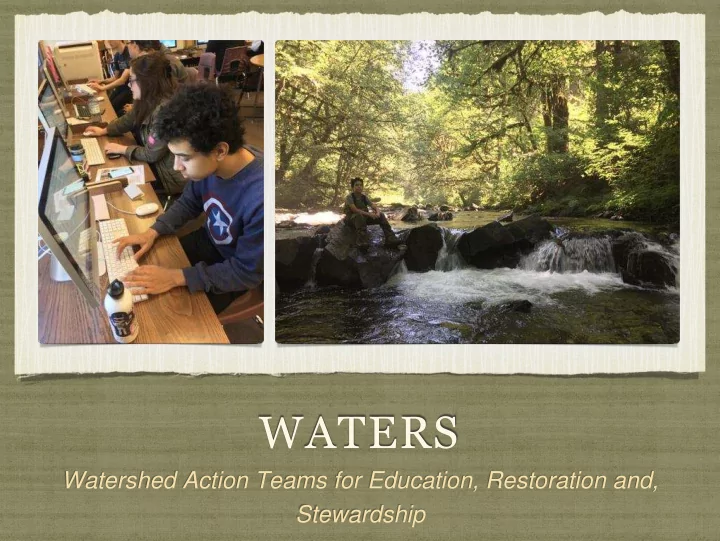

WATERS Watershed Action Teams for Education, Restoration and, Stewardship
THE BASICS WATERS focuses on direct involvement of students in hands-on, inquiry- and field-based projects centered in environmental education. • Primary goals: • Increase collaboration among environmental educators, public agencies, and non-profits • Develop field-based watershed research and stewardship teams (H.S & M.S.) • Identify and complete restoration or monitoring projects for each team • Promote understanding of scientific methods and protocols, critical thinking and problem solving • Promote student collaboration, leadership and peer-to- peer learning • Prepare students for work in environmental fields • Increase diversity amongst student participants
THE TEAMS HIGH SCHOOL TEAMS • Aquatic habitat survey • Thurston H.S. • Springfield H.S. • Water quality testing • Thurston H.S. • Springfield H.S. • McKenzie H.S. • Mohawk H.S.
WATER QUALITY TEAM LOCATIONS (MOHAWK)
WATER QUALITY TEAM LOCATIONS (MCKENZIE)
SPRINGFIELD H.S. WATER QUALITY SITES
THURSTON H.S. WATER QUALITY SITES N
AQUATIC HABITAT SURVEY SITES Strube Ponds Gate Creek
WATERS CONFERENCE Capstone event for high school team members Conference planning under way Will take place in May Students present reports or posters on data analyzed this year Expert panel composed of project partners will engage with presenters Middle school students may participate in a juried art contest
PARTNERSHIP Real world projects benefit both students and partners Monitoring data used for in- stream projects (USFS, BLM) Water quality data shared with EWEB Native plantings and maintenance at active restoration sites (MRT, landowners) Regional approach
CFWWC Programatic start in Fall 2016 • Lincoln Middle School Five schools involved now • All middle schools in the Coast Fork watershed. Eventual expansion in to area high schools
THE TEAMS MIDDLE SCHOOL RESTORATION TEAMS • McKenzie M.S. • Coburg Community Charter School • Agnes Stewart M.S. (two teams) • Briggs M.S. • Hamlin M.S. • Thurston M.S. • Lincoln Middle School • Dorena School • Child’s Way Charter School • London School • Creswell M.S.
RESTORATION TEAM LOCATIONS (MWC) Finn Rock Reach • McKenzie M.S. Green Island • Coburg Community Charter School Berggren Watershed Conservation Area & Dehne Property • Agnes Stewart M.S. (two teams) • Briggs M.S. • Hamlin M.S. • Thurston M.S.
RESTORATION TEAM LOCATIONS (CFWWC) Rujada Campground • Child’s Way Charter School • Dorena School London School grounds (Coast Fork Willamette River) • London School Row River Nature Park • Lincoln Middle School Creswell Oaks • Creswell Middle School
FIELD STUDY LESSONS Watershed basics Riparian ecology / soil science introduction Twig ID Water quality Benthic macro-invertebrates ID Leaf ID Fish ID
RESTORATION OLYMPICS Annual capstone event held in June Middle school students from region (200 approx.) Events include: 1. Post-assessment test 2. Mulching 3. Plant ID 4. Macro-invertebrate ID 5. Fish ID Prizes for top three teams & pizza for all
STUDENT TAKE AWAY Meets Next Generation Science Standards Awareness of local ecology Introduction to scientific methods Career development and potentials Outdoor experience Builds teamwork ethic and longterm relationships Multiple years of participation foster sense of ownership Reinforces importance of collaboration and partnerships Empowers students and their ability to make an impact at any age
PROGRAM COSTS Expense Amount MWC Staff $50,400 CFWWC Staff $19,750 Transportation $4,120 Substitute Teachers $25,625 Supplies $22,131 Administration/ $13,599 Indirect TOTAL $135,625
WATERS FUNDING (2018) Funder Amount Bureau of Land Management $5,000 City of Cottage Grove $3,500 City of Creswell $3,000 Environmental Protection Agency $38,000 Eugene Water & Electric Board $18,500 Gray Family Foundation $8,000 Oregon Community Foundation $1,000 Oregon Watershed Enhancement Board $24,948 Private Donations/Local Match (MWC) $7,625 Private Donations (CFWWC) $24,052 Springfield Public Schools $2,000 TOTAL $135,625
FUNDING CHALLENGES OWEB funding changes (no programmatic funding after 2018-19) EWEB Source Water Protection Program limitations (local match) Uncertainty in federal funding (EPA, NFWF) Private foundations: • Limited funding availability • Increased competition • Funder fatigue
FUNDING STRATEGIES Integrate education funding line items into OWEB Restoration requests • Riparian restoration team time at active sites • Aquatic habitat survey pre and post assessments • Water quality data collection Leverage local partners to expand existing support • Financial • In-kind Identify and maximize private foundation funding opportunities Increase private donations Increase private donations
THANK YOU! Questions, comments or feedback?
Recommend
More recommend